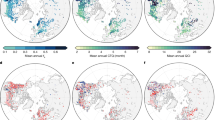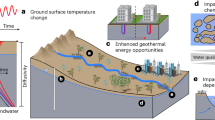Abstract
FROM a paragraph in the “Notes” in NATURE of March 1 (vol. lxi. p. 422), it will be seen that the theory advanced by Mr. C. T. R. Wilson, of the Cavendish Laboratory, Cambridge, and recently supported by Elster and Geitel, of the origin of atmospheric electricity is gradually crystallising and becoming accepted, as might be expected when supported by such authorities. This theory is founded on the very beautiful and interesting experiments of these investigators, which show that there are ions in our atmosphere, and that these ions can form nuclei for the condensation of water vapour; and, further, that the negative ions become centres of condensation with a less degree of super-saturation than the positive ones, and consequently during condensation they will be the first to be carried down by precipitation, the positive ions being left in the atmosphere.
This is a preview of subscription content, access via your institution
Access options
Subscribe to this journal
Receive 51 print issues and online access
$199.00 per year
only $3.90 per issue
Buy this article
- Purchase on Springer Link
- Instant access to full article PDF
Prices may be subject to local taxes which are calculated during checkout
Similar content being viewed by others
Author information
Authors and Affiliations
Rights and permissions
About this article
Cite this article
AITKEN, J. Atmospheric Electricity. Nature 61, 514–515 (1900). https://doi.org/10.1038/061514c0
Issue Date:
DOI: https://doi.org/10.1038/061514c0
Comments
By submitting a comment you agree to abide by our Terms and Community Guidelines. If you find something abusive or that does not comply with our terms or guidelines please flag it as inappropriate.



